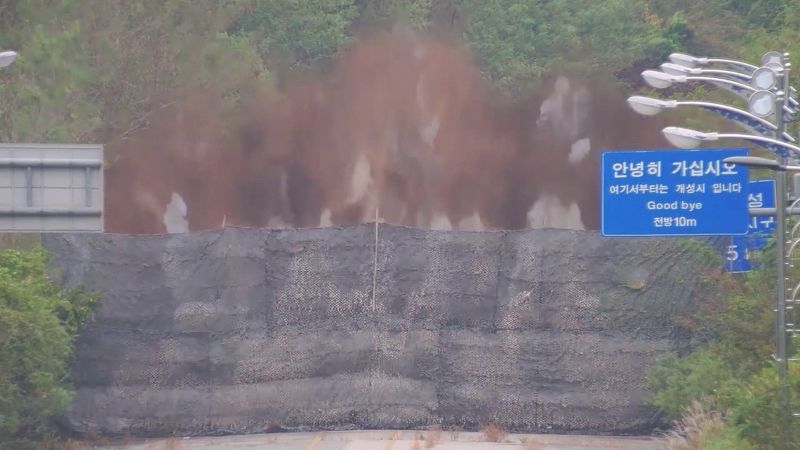Seoul, South Korea
CNN
—
North Korea on Tuesday blew up parts of two main roads connecting the southern part of the peninsula, after South Korean officials warned Pyongyang would move to completely cut off its territory from the south.
According to Seoul’s Joint Chiefs of Staff, parts of the Gyeonggi Line on the west coast and the Donghae Line on the east coast, two major road and rail links connecting the north and south, were destroyed by explosives around 12 noon Korean local time. )
In practice, destroying travel routes makes little difference—the two Koreas are separated by one of the world’s most fortified borders, and the roads have been out of use for years. But its symbolism comes at a time of particularly fiery rhetoric between the two Korean leaders.
Video shared by South Korea’s defense ministry showed multiple explosions on streets north of the military demarcation line that separates the two Koreas. According to the video, heavy machinery, including trucks and excavators, was sent to at least one road. JCS said the North was carrying out “additional work with heavy machinery” at the scene, but did not elaborate.
In response to the explosions, the South Korean military opened fire into the area south of the Military Demarcation Line and is closely monitoring the North Korean military’s movements, “in full readiness under the cooperation of the United States,” the JCS said.
On Monday, South Korea said it had detected signs that North Korea was preparing to demolish roads connecting the two countries, warning that explosions could happen immediately. Its military carried out countermeasures, the defense ministry said, but did not provide specific details.
Lee Chung-joon, a spokesman for the JCS, said the South Korean military was found working behind barriers set up on roads on the northern side of the border.
The explosions come days after North Korea accused South Korea of flying propaganda-laden drones over its capital, Pyongyang.
Last week, North Korea’s military warned it would take “substantial military action” to completely cut off its territory from South Korea, after North Korean leader Kim Jong Un scrapped a long-standing policy of peaceful reunification with South Korea earlier this year.
Since the end of the Korean War in 1953, North and South Korea have been separated by an armistice agreement. The two sides are still technically at war, but both governments have long sought the goal of one day reunification.
In January, Kim said North Korea would no longer seek reconciliation and reunification with South Korea, describing inter-Korean relations as “a relationship between two hostile nations and two belligerents at war,” KCNA reported at the time.
In a statement carried by state-run news agency KCNA on October 9, the Korean People’s Army (KPA) General Staff announced that the remaining roads and railways connecting to the South would be completely cut off, blocking access to the border.
“The severe military situation on the Korean Peninsula requires the armed forces of the DPRK to take more decisive and strong action, and to more credibly protect national security,” he said in a statement referred to by North Korea’s initials KCNA. Its official name is the Democratic People’s Republic of Korea.
Public officials said the move was a response to recent “war drills” in South Korea and visits to what it says are US strategic nuclear assets in the region. In the past year, a US aircraft carrier, amphibious assault ships, long-range bombers and submarines have visited South Korea, drawing angry condemnations from Pyongyang.
According to the South Korean military, since January, Pyongyang has strengthened its border defenses, laying mines, building anti-tank traps and dismantling railway infrastructure.
North and South Korean leaders have also stepped up their fiery rhetoric.
Earlier this month, Kim threatened to use nuclear weapons to destroy South Korea if it attacked, and South Korea’s president warned that if North Korea used nuclear weapons it would “face the end of its regime.”
North Korea appears to have stepped up its nuclear production efforts and strengthened ties with Russia, deepening widespread anxiety in the West over the isolationist nation’s direction.
Leif-Erik Eisley, a professor at Ewha Women’s University in Seoul, says North Korea’s move to cut off its territory from the south is a way for Kim to “shift the blame for its economic failures and legitimize its expensive missiles and nuclear weapons.” By exaggerating external threats.
“Kim Jong Un wants domestic and international observers to believe he is acting on military strength, but he may actually be motivated by political weakness,” he said. “North Korea’s threats, real and rhetorical, reflect the regime’s survival strategy of a hereditary dictatorship.”





